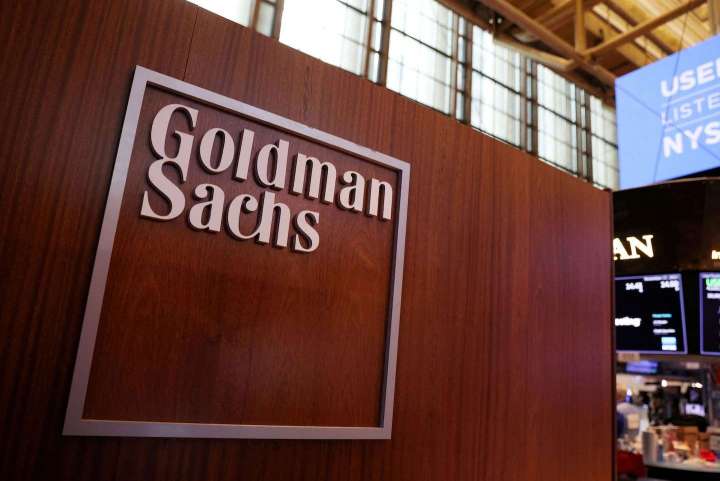Stocks slipped Monday as the relief investors derived from bank earnings and signs the Federal Reserve would stay the course on interest rates were overshadowed by reports of slower growth at Apple.
Stocks give up gains amid earnings rush and worries of a downturn

Earlier Monday, traders appeared to be leaning into the idea the Fed would not escalate its already-aggressive rate hike plan to tamp down blazing-hot inflation. After the Bureau of Labor Statistics released data last week showing the consumer price index was 9.1 percent higher in June than it was a year ago, many market observers worried the central bank might choose to raise rates by a full percentage point, or 100 basis points, at its July 27-28 meeting instead of the widely anticipated 0.75 percentage points.
An increase of 100 basis points would be a major leap, because the Fed has not bumped up rates at that level since the early 1990s. It would also show a clear ramping-up from earlier this year, fueling critics of the Fed who have argued that officials acted too slowly to address surging price hikes and are only now fighting inflation from behind. Last week, the Bank of Canada announced it would raise interest rates by 100 basis points, sparking speculation its American counterpart would follow suit.
“The more aggressive the rate hike, the greater the chance of pushing the U.S. economy into recession,” said Kristina Hooper, the chief global market strategist at Invesco. “Monetary policy is a blunt instrument, not a surgical tool. It becomes a lot blunter when rates go up 100 basis points at one meeting.”
For the central bank, raising rates is a delicate balancing act. It has already raised rates three times this year: a quarter-point in March, a half-point in May and three-quarter of a point in June, catching some on Wall Street by surprise. Though the rate hikes are designed to cool the economy, they could also tip it into a recession if they slow economic activity too forcefully or too quickly. Fed officials have acknowledged that achieving price stability may give way to sluggish growth and layoffs.
Whatever optimism was brewing Monday around interest rates evaporated after Bloomberg News reported that Apple was planning to slow hiring and spending in some divisions next year in anticipation of a potential economic downturn. Company shares fell nearly 2.1 percent.
The tech giant did not immediately respond to a request for comment.
Volatility could be elevated this week as Wall Street turns its attention to corporate earnings. On Monday, Goldman Sachs reported better-than-expected quarterly results ahead of the opening bell. Though revenue fell 23 percent, to $11.86 billion, it was $1 billion more than analyst estimates thanks to a 55 percent surge in fixed income revenue, including government and corporate bonds. Profit slumped 48 percent to $2.79 billion as a result of an industry-wide decline in investment banking activities. Goldman shares climbed more than 2.5 percent.
Bank of America, meanwhile, reported a 5.6 percent jump in revenue, to $22.79 billion vs. forecasts of $22.67 billion. The bank benefited from rising interest rates, pushing net interest income up 22 percent. But profit declined 32 percent to $6.25 billion in the second quarter. Shares were virtually unchanged.
Results roll in from Netflix, Johnson & Johnson, Tesla, Twitter and a host of other companies in the coming days.
Elevated fuel costs are also weighing heavily on corporate America. Delta, the first major airline to report second-quarter earnings, posted a quarterly profit as travelers shelled out for higher airfare. Fuel prices for Delta rose 37 percent, compared with the prior three-month period. The airline said it has hired 18,000 employees since the start of 2021, bringing its staffing to 95 percent of its pre-pandemic level. Even with the boosted hiring, however, passengers are dealing with widespread flight cancellations. American Airlines and United Airlines report earnings later this week, and Southwest posts at the end of the month.
Earnings reports can carry extra weight during periods of uncertainty and pessimism because disappointing results can spark a strong pullback from investors grasping for new information.
The global economic outlook has worried investors with signs of recession amid rising inflation, putting central banks under the spotlight. The European Central Bank is set to meet Thursday as the euro zone reels from high inflation, a brewing energy crisis and other fallout from the Russian invasion of Ukraine. The bank is expected to raise interest rates for the first time in 11 years.
The labor market continues to serve as a bulwark against growing recession fears. Federal data released earlier this month show hiring was brisk in June, keeping the U.S. unemployment rate at a low 3.6 percent. What’s more, consumer spending has remained resilient, highlighting the conflicting signals that officials and analysts are parsing to get a sense of where the economy is headed.
Some data shows signs of a slowing economy, especially in the once-red hot housing market, reflecting the consequences of higher interest rates, which make loans more expensive for businesses and consumers. The average rate for a 30-year fixed rate mortgage is now at 5.51 percent, according to Freddie Mac, up from less than 3 percent a year ago.
Confidence among builders of single-family homes plunged this month, according to a new survey. The National Association of Home Builders/Wells Fargo Housing Market Index, a monthly glimpse of market conditions, showed that sentiment fell to levels not seen since the first summer of the pandemic, when the public health crisis gripped the national economy. Home builder confidence fell by 12 points compared with June’s figure, and follows a sinking trajectory that began in March, when the Fed began to increase interest rates.
The cooling housing market reflects broader changes in the economy as policymakers work to pull inflation under control. Near-zero interest rates in 2020 and 2021 helped fuel the housing market boom and coincided with record-shattering gains on Wall Street.






